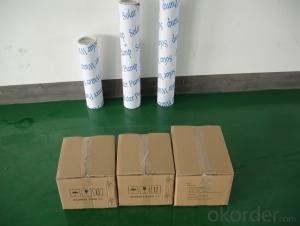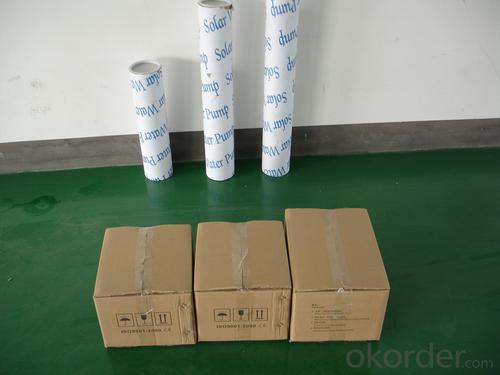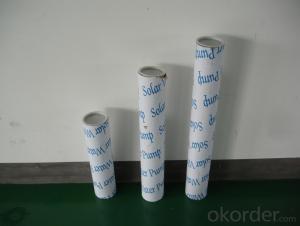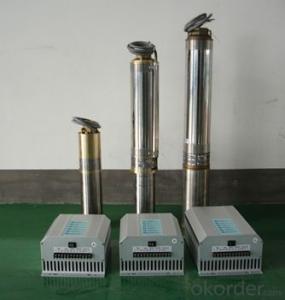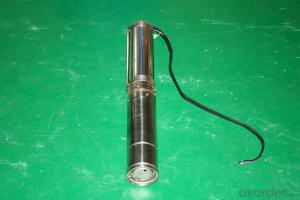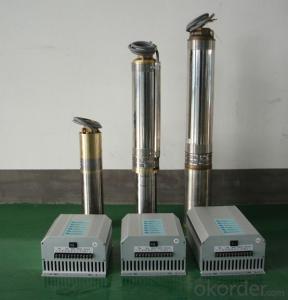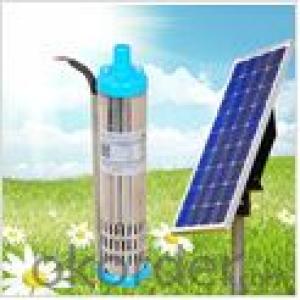Inline Solar DC Submersible Water Pumps
- Loading Port:
- China Main Port
- Payment Terms:
- TT OR LC
- Min Order Qty:
- -
- Supply Capability:
- -
OKorder Service Pledge
OKorder Financial Service
You Might Also Like
Item Description :
This superb new addition to our solar fountain range comes with a 10w solar panel,and a powerful fountain pump that is capable of producing fountains of up to 2m in height. As well as being easy to set up and use.Instruction manual is supplied for assembly and maintenance.
Solar Fountain Key Features :
Powered by direct sunlight
No high voltage electric mains required
Safe for children
Max. height of fountain: 2M
Max. flow capacity: 800 L/H(176 GAL)
10W Polycrystalline solar panel included
18V DC brushless pump
Solar Pump Features :
Can produce fountains up to : 2M (tube height) 1.4M (fountain height)
Comes with multiple nozzle accessories
Cable Length : 5M
Solar Panel Features :
10W peak power.
Polycrystalline highly efficient solar panel
Comes mounted in aluminium frame
Comes with ground stake and rotating knob so you can angle your panel toward the sun
What You Will Get :
10W solar panel
Solar pump
Ground Sake
Nozzle accessories
Precautions :
DO NOT alter or change the product itself or its components
Operate pump in freshwater only, never above 50 degrees celsius
Keep away from flammable liquids
Do not connect to any other power supply other than the included
- Q: How much space is required for installing a solar pump system?
- The amount of space required for installing a solar pump system can vary depending on the size and capacity of the system. Generally, a solar pump system requires a minimum of a few square meters of space for the installation of solar panels, as well as additional space for the pump and storage tanks. It is important to consult with a professional to determine the specific space requirements based on the individual system's specifications.
- Q: What is the expected energy consumption of a solar pump system over its lifetime?
- The expected energy consumption of a solar pump system over its lifetime is relatively low as it primarily relies on solar energy to operate. The system uses photovoltaic panels to convert sunlight into electricity, which powers the pump. Since solar energy is a renewable and abundant source, the energy consumption is significantly reduced compared to traditional pump systems that rely on fossil fuels or electricity from the grid. Additionally, as solar pump systems do not require fuel or generate greenhouse gas emissions, they provide a more sustainable and cost-effective solution for water pumping needs.
- Q: How do I determine the water requirements for my application?
- In order to determine the water requirements for your application, there are several factors that need to be taken into consideration. Firstly, it is important to assess the specific needs of your application. It is necessary to determine the quantity of water required for each process or task involved. This may include tasks such as cleaning, cooling, or mixing. The next step is to evaluate the water quality that is needed for your application. Depending on the processes involved, some applications may require purified or distilled water, while others may be suitable for regular tap water. Understanding the required water quality will help in identifying the necessary treatment or filtration processes. The water pressure and flow rate required for your application should also be considered. Certain processes may require high-pressure water jets or a continuous flow of water. It is crucial to ensure that the water supply can meet these specific requirements. Furthermore, it is important to assess the availability and accessibility of water in your location. Factors such as the water source, its availability throughout the year, and any restrictions or regulations related to water usage in your area should be taken into account. Considering the environmental impact of your water usage is also essential. It is necessary to evaluate and implement sustainability and conservation measures to minimize wastage and reduce the overall water footprint of your application. Lastly, consulting with experts or professionals in the field is highly recommended. Their experience and knowledge can provide valuable guidance in determining the specific water requirements for your application and suggest any necessary equipment or technologies to meet those requirements. By taking into account these factors and seeking expert advice, you can effectively determine the water requirements for your application and ensure that you have a sufficient and sustainable water supply.
- Q: How does a solar pump handle water with high levels of pesticides or herbicides?
- A solar pump does not have any specific mechanism to handle water with high levels of pesticides or herbicides. However, some advanced filtration systems can be installed in conjunction with the solar pump to remove or reduce the concentration of these contaminants in the water before it is pumped.
- Q: Are there any specific installation requirements for a solar pump in a well?
- Yes, there are specific installation requirements for a solar pump in a well. These requirements include ensuring proper sizing of the pump to match the well's water output, positioning the solar panels at an optimal angle and orientation to maximize sunlight exposure, and using suitable wiring and controls for the system. Additionally, it is important to ensure proper well casing and sealing to prevent any contamination of the well water.
- Q: How much sunlight is needed to operate a solar pump?
- The amount of sunlight needed to operate a solar pump depends on various factors such as the size and efficiency of the pump, the capacity of the solar panels, and the geographical location. In general, solar pumps require a minimum amount of sunlight to function optimally. The most efficient solar pumps can operate with as little as 2-3 hours of direct sunlight per day. However, this is a minimum requirement, and for better performance, longer exposure to sunlight is recommended. Ideally, solar pumps should receive 5-6 hours or more of full sunlight to generate enough power to meet their pumping requirements. It is important to consider the weather conditions as well. Cloudy or overcast days can significantly reduce the amount of sunlight reaching the solar panels, which may affect the pump's performance. In regions with limited sunlight, it is advisable to install additional solar panels or use a battery backup system to ensure a constant power supply for the pump. It's worth mentioning that solar pumps can also work with indirect or diffused sunlight, although the efficiency may decrease. Therefore, even on partially cloudy days, solar pumps can still operate, albeit with reduced output. To determine the exact sunlight requirements for a specific solar pump, it is recommended to consult the manufacturer's specifications or seek advice from a solar energy professional who can assess the local conditions and provide accurate guidance.
- Q: How does a solar pump handle water pressure?
- A solar pump handles water pressure by utilizing the power generated from solar panels to operate a motor or pump. The pump is designed to handle the specific water pressure requirements of the system, ensuring efficient water delivery while maintaining the necessary pressure levels.
- Q: How does the type of soil affect the installation of a solar pump?
- The type of soil can affect the installation of a solar pump in various ways. For example, sandy or loose soil may require additional stabilization measures to ensure the pump remains securely anchored. On the other hand, clay or compacted soil may pose challenges in terms of drilling holes or burying pipes. Additionally, soil composition can impact the efficiency of the pump by affecting the flow of water and the absorption of sunlight. Therefore, it is crucial to consider the soil type when installing a solar pump to ensure proper anchoring, efficient operation, and long-term performance.
- Q: How does the cost of operating a solar pump compare to a traditional pump?
- The cost of operating a solar pump is generally lower compared to a traditional pump. Solar pumps are powered by renewable energy from the sun, which means they do not require the use of electricity or fuel, resulting in reduced operational costs. Traditional pumps, on the other hand, rely on electricity or fuel, which can be expensive and subject to price fluctuations. Solar pumps have lower maintenance costs as well since they have fewer moving parts and do not require frequent repairs or replacements. In contrast, traditional pumps may require regular maintenance, such as oil changes, belt replacements, or motor repairs, which can add to the overall operating expenses. Additionally, solar pumps are environmentally friendly as they do not emit greenhouse gases or contribute to air pollution, unlike traditional pumps that often rely on fossil fuels. This not only reduces the carbon footprint but also eliminates the need for storing, transporting, and handling potentially harmful substances. While the upfront cost of purchasing and installing a solar pump may be higher than that of a traditional pump, the long-term savings in operating costs, maintenance, and environmental impact make solar pumps a more cost-effective and sustainable option.
- Q: Can a solar pump be used for irrigation in hilly terrains?
- Yes, a solar pump can be used for irrigation in hilly terrains. Solar pumps are highly versatile and can be installed in various geographical landscapes, including hilly terrains. They are particularly suitable for such terrains as they utilize renewable solar energy, eliminating the need for grid electricity. Additionally, solar pumps offer flexibility in terms of installation and can be easily deployed in remote areas without access to electricity, providing a sustainable solution for irrigation in hilly regions.
Send your message to us
Inline Solar DC Submersible Water Pumps
- Loading Port:
- China Main Port
- Payment Terms:
- TT OR LC
- Min Order Qty:
- -
- Supply Capability:
- -
OKorder Service Pledge
OKorder Financial Service
Similar products
Hot products
Hot Searches
Related keywords
